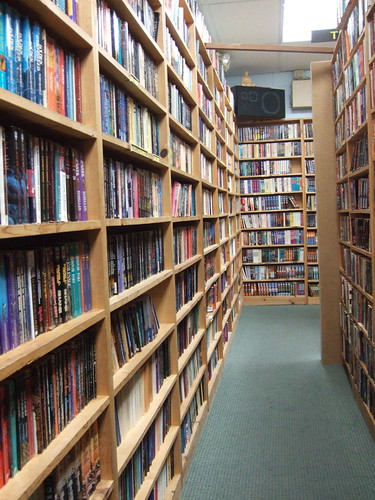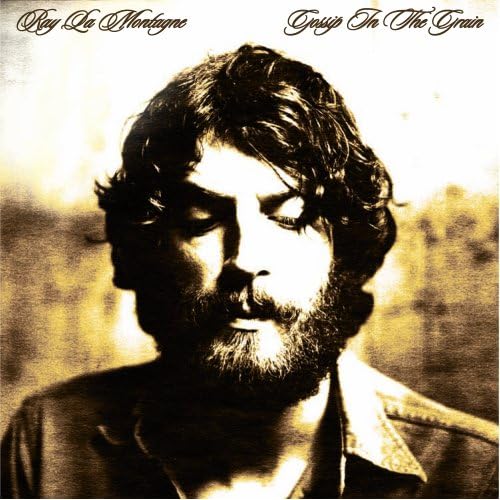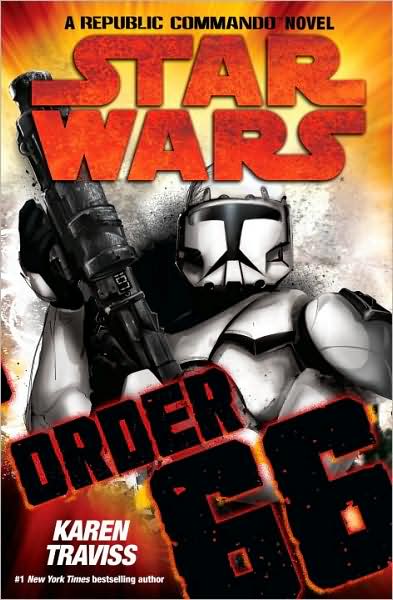I came across this fantastic article by Michael Saler earlier today and read it several times while at lunch. It's entitled The Rise of Fan Fiction and Comic Book Culture. Actually, it has very little to do with fan fiction or comic books, but it does provide a good look at the perceptions of comic books and related 'genre' books out there in the world, by reviewing two books, The Ten Cent Plague by David Hajdu and Maps and Legends by Michael Chabon. I actually own The Ten Cent Plague, and I think that after I finish the book I'm currently reading, I'll start that one next. I don't have the one by Chabon, but I am a huge fan of his works.
Throughout recent years, Science Fiction has been a fairly embattled genre as a whole. As Saler points out, there's a bit of a culture war that has gone on, predictably, between more traditional values and newer upstarts such as this. Hajdu's book details the craze in the 1950s that the comic book industry as a whole faced - congressional and public pressure to ban its content, due to violence and sexual content. The movement became so powerful that book burnings were commonplace and eventually, the industry sought to impose its own restrictions, which has severely limited the content that can be published in the years since. It's only been recently that comics have really broken out of their shell and begun to explore much darker themes. Still, this has created a notion that comic books are largely children's affairs, a view that is really coming up against reality, especially in the light of recent movies such as Sin City, 300 and The Dark Knight, all of which are incredibly violent, well received publically and all based on comic books.
Part of this disconnect seems to stem from a perception that various genre stories are essentially lesser components of literature, to which Chabon states: "All literature, highbrow or low, from the Aeneid onward, is fan fiction." I'm not sure that I'd make that argument, but I've heard it reiterated before, that there are only a handful of basic story types, and that everything else is simply based off of them. If that's the case, why is there still a disconnect?
I think that people just largely ignore that theory in the face of modernity and originality that recent culture and events brings about, as well as a certain amount of relevance for whatever is coming out. On top of that, I see a split between the purposes of various media types. On one hand, which would seem to be the more traditional side, there is a true creativity and design that authors put together to create some fantastic works. On the other side, a far more modern and contemporary view, is a growing trend of media and tie-in fiction (or non-fiction in some cases) that are commissioned to promote and enhance a series franchise. Star Wars and Star Trek comes readily to mind, but there are many, many others to go along with those. Almost every movie that comes out in the Sci-Fi / Fantasy / Horror genres are accompanied by a series of books, comic books, video games, action figures and all sorts of other things that tie into the story or add on to it. Star Wars is a fairly good example of how this works when it's done well - there's a strong continuity here, and it has no signs of slowing down anytime soon. Star Trek, by all reports that I've heard, is a fairly scattered series, with nothing linking everything together.
Saler brings up an interesting point: "Like Hajdu, Chabon defends mass entertainment against the accusation that it is merely a formulaic product. At times it is; yet commercial culture's focus on deadlines and profits can also act as a 'quickening force' on an artist's imagination". I think the bigger issue is that in this case, tie-in novels are essentially viewed as a product, which implies a certain shallowness as opposed to something that is more self-indulgent for an independent book.
Karen Traviss wrote a fantastic essay on the subject entitled Sprinting the Marathon , where she is very forward with her desire and appreciation of working in someone else's universe, and dismisses the notion that the books that she works on for the Star Wars (and now Gears of War) universe are any less original:
I write media tie-ins for Lucasfilm as well as my own "original" fiction, and I realize that bewilders a few people. I always slap inverted commas on the word "original"; it's a meaningless term, partly because nobody can define originality, and partly because everything — absolutely everything — has been done before. A book’s worth lies in its execution and the impact it has on the individual reader. So let’s call it creator-copyright. That’s the only hard line between the two.
On examination, my critically-acclaimed Wess’har series is as much set in a shared universe as any tie-in. It’s a world of long-established tropes like everyone else’s "serious" fiction: aliens, interstellar space flight, culture clashes, colonialism, armed conflict. Those are shared elements across SF. So why should similar shared elements in the form of continuity render a tie-in beneath contempt? You can, if you want to, take as fresh a look at that shared universe as you can your own. Lucasfilm let me question the heroic image of the Jedi and show them as a morally compromised elite who’d taken their eye off the spiritual ball. Some readers were unsettled by it. Most, though, leapt on it and said it was a question they always wanted to see asked.
That being said, I think that it has to be noted that Karen is an absolutely fantastic writer because she seems to put the same amount of effort, planning, blood, sweat and tears into all of the books that she's done, whether it's the Wess'Har Wars series or her fantastic Republic Commando series. Karen actually followed up with this idea today with this post.
I don't fault Karen for a moment for her work with LFL - she does a fantastic job at it, and her Star Wars books are among some of the better thought out and plotted novels out there, on par with some Non-genre SciFi books. One of the big distinctions to make here is that Karen is really not a common writer when it comes to Tie-in fiction. Where she lives and breathes the work, she also has a considerable amount of talent to back it up. The alternatives pale in comparison, such as Keith R.A. DeCandido, who churns out novel after novel, but from what I've read, the writing level is fairly poor and simple. The Serenity novelization follows the movie to a T, with only the slight detour to really pick on a couple characters personalities. Karen, on the other hand, has formed a fully fleshed out set of characters that far surpasses expectations of merely following a storyline that's largely already been written. Other authors that I've read, such as Peter David, falls somewhere in between there.
To some extent, I agree with Karen and all of her reasons for writing in someone else's backyard, and I hope that she's the future of this massive trend. What makes me hold back, however, is that the genre fiction section seems to also be a section for authors who are aspiring, but largely lacking in talent, to cut their teeth and to get into a cycle and create an impression on the larger literary community that this is the norm and what tie-in media will be - something based off of a concrete universe with subpar writing. Mass culture, as termed by Saler is by no means bad - it can and is quite good at times. But consequently, there is a reason for some of the perceptions of the genre. I suspect that this gets wrapped into an overarching feeling that Science Fiction, comic books, fantasy, role-playing, films, and tie-in novels are something of child's play, while the 'Real authors' get to doing serious works.
I do agree with this, to a degree. While Karen and others make a solid point that everything has already been done before, tie-in media works with a far more realized grasp. There's limitations already imposed on characters and the actions that they can take, and it seems to be extremely hard for an author to break free from this and really challenge the heroes because it will put them into unknown territories as far as most fans are concerned, and they might not like that. Thus, working with these situations is a familiar grasp, because we all know that Luke Skywalker or James Kirk won't get killed, and everything will largely be back to normal. Fortunately, at least for the Star Wars universe, this isn't always the case, as several main characters have been axed, such as Anakin Solo and Chewbacca. We know that Luke is dead at some point, and thus some of the suspense is off. Even then, fans have some very strong reactions to the deaths of favorite characters. R.A. Salvatore received death threats when he killed off Chewbacca, and I know author A.C. Crispin and Karen Traviss no longer frequents various message boards because of problems with fans there.
Additionally, any really good entries in a tie-in universe tend to be shackled to these perceptions of subpar and inferior works, which is both unfair and untrue. Shatterpoint, by Matthew Stover, proved to be a fantastic read in and of itself, because of the themes and ideas that it drew upon, including the works of Joseph Conrad. Still, this book is unlikely to be recognized as such because of the franchise title on the cover.
Original fiction, even in genres such as Science Fiction have an air of a certain legitimacy to them, because they are far more original works than something such as a tie-in novel. This may be easier or harder, depending on the author, but at times, it is refreshing to read something that's fairly new, that incorporates new ideas that might not come as readily in a tie-in world. I'd be very, very surprised to find something of the caliber of the works of Charles Stross, Neil Gaiman, Richard K. Morgan or Scott Lynch in a universe such as the Star Wars franchise because of the things that they are able to do in their own universes, but also because those universes that they create are so different and equally realized, all on their own. There has to be a certain amount of pride in the creation of one's own little world, despite some of the advantages of working in someone else's.
I don't think that there's anything inherently good or bad when it comes to genre or tie-in fiction. What really matters is the author behind the steering wheel, directing the story. If you've got a competent author, they weave in and out of traffic with ease. If they're not, they're one of the baseline reasons for the ten car pileup and bad perceptions, because everybody slows down to watch the car accident.











 Karen Traviss's four book series based off of the
Karen Traviss's four book series based off of the 
 (This should have been the cover...)
(This should have been the cover...)
 Dion, from a walk earlier this month
Dion, from a walk earlier this month




